

Stealth Startups, Get Over Yourselves: Nobody Cares About Your Secrets. When Preetam Mukherjee started Marcellus.tv in March 2007, his company was one of the very few players in the professional online video hosting space.
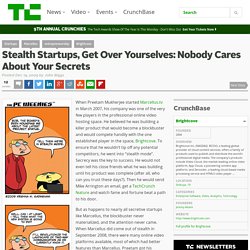
He believed he was building a killer product that would become a blockbuster and would compete handily with the one established player in the space, Brightcove. To ensure that he wouldn’t tip off any potential competitors, he went into “stealth mode”. Secrecy was the key to success. He would not even tell his close friends what he was building until his product was complete (after all, who can you trust these days?). Then he would send Mike Arrington an email, get a TechCrunch feature and watch fame and fortune beat a path to his door. But as happens to nearly all secretive startups like Marcellus, the blockbuster never materialized, and the attention never came. As I’ll tell you later, Preetam’s story does have a happier ending, but that’s not how it is for most startups. Well, Emerson was wrong. What about the big PR moment? Eight Reasons Why I Don’t Sign NDAs at Our First Meeting. “Secrecy is the enemy of efficiency, but don’t let anyone know it.”
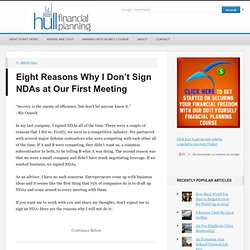
–Ric Ocasek In my last company, I signed NDAs all of the time. There were a couple of reasons that I did so. Firstly, we were in a competitive industry. We partnered with several major defense contractors who were competing with each other all of the time. As an advisor, I have no such concerns. If you want me to work with you and share my thoughts, don’t expect me to sign an NDA. Continues Below You’ve started out the relationship in a position of mistrust.
Why Investors Don't Sign NDA's - Fundable. There’s a popular misconception amongst first-time entrepreneurs that sharing a mere idea without having a signed Non-Disclosure Agreement (NDA) in place will lead to your own version of The Social Network, wherein Mark Zuckerberg (played by Jesse Eisenberg) steals the Facebook idea and becomes a billionaire.
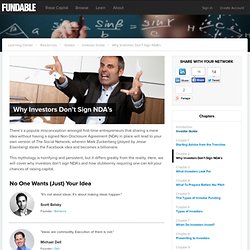
This mythology is horrifying and persistent, but it differs greatly from the reality. Here, we will cover why investors don’t sign NDA’s and how stubbornly requiring one can kill your chances of raising capital. No One Wants (Just) Your Idea “It’s not about ideas. NDA – Nix Decent Agreement » memonic. As a sidekick to our current gig, we perform a bit of consulting.
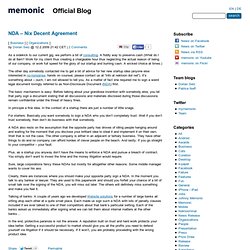
A fiddly way to preserve cash (What do I do at 8am? Work for my client thus creating a chargeable hour thus neglecting the actual reason of being of our company, or work full speed for the glory of our startup and burning cash. A wicked choice at times.) The other day somebody contacted me to get a bit of advice for her new startup idea (anyone else interested in no-nonsense, hands on counsel, please contact us at “info at nektoon dot net”).
It’s something about – ouch, I am not allowed to tell you. The basic mechanism is easy: Before talking about your grandiose invention with somebody else, you let that party sign a document stating that all discussions and materials disclosed during those discussions remain confidential under the threat of heavy fines. Überschätzt und oft sinnlos: 5 Argumente gegen NDAs. Geheimhaltungsvereinbarungen bringen unnötigen Aufwand und sind nicht selten sogar kontraproduktiv.
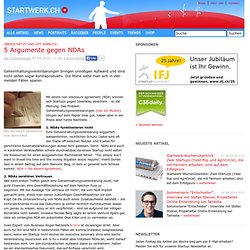
Die Mühe sollte man sich in den meisten Fällen sparen. Non-disclosure agreements sind überschätzt Mit einem non-disclosure agreement (NDA) können sich Startups gegen Ideenklau absichern – so die Meinung. Das Problem: Geheimhaltungsvereinbarungen (hier ein Muster) klingen auf dem Papier zwar gut, haben aber in der Praxis aber herbe Nachteile. 1. 2. Sven Eppert vom Business-Angel-Netzwerk b-to-v ist da weniger strikt. 3. 4. 5. Anders sieht übrigens der Fall bei Banken und Anwälten aus. Startup Reality Distortion #3: The Fallacy Of the Non-Disclosure Agreement (NDA) In my role as angel investor and informal startup advisor, the issue of NDAs (non-disclosure agreements) comes up about once or twice a month.
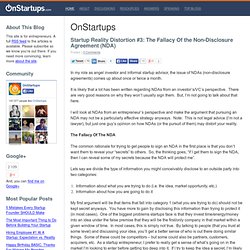
It is likely that a lot has been written regarding NDAs from an investor’s/VC’s perspective. There are very good reasons on why they won’t usually sign them. But, I’m not going to talk about that here. I will look at NDAs from an entrepreneur’s perspective and make the argument that pursuing an NDA may not be a particularly effective strategy anyways. Note: This is not legal advice (I’m not a lawyer), but just one guy’s opinion on how NDAs (or the pursuit of them) may distort your reality. The Fallacy Of The NDA The common rationale for trying to get people to sign an NDA in the first place is that you don’t want them to reveal your “secrets” to others. Lets say we divide the type of information you might conceivably disclose to an outside party into two categories: Finally, lets take a look at the cost of actually asking people to sign an NDA.